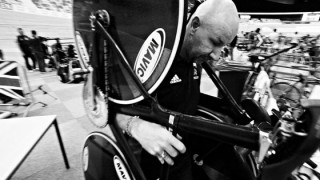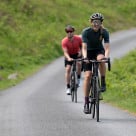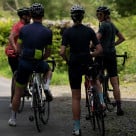Published: 8 June 2012
Words: Simon Powers![]()
Last week: Biomechanist Paul Barratt
We are all familiar with many of the riders and coaches responsible for the great performances of the Great Britain Cycling Team. But in the lead up to this summer’s Games, we’re taking the opportunity to have a look at some of the staff from the Great Britain Cycling team who tend to go unnoticed but without whom, the team could not function.
Above: Ernie with another two precision built bikes destined for the start gate
Ernie Feargrieve is the Lead Mechanic at Major Championships for the Great Britain Cycling Team. London will be his fourth Olympics, the second one on the track with the previous two being purely on the road.
“It just great fun, I’ve been doing this job for 14 years for British Cycling and every day it just feels like I’ve been playing hooky from school.”
“I started off going to watch bike racing and then became a rider. I soon discovered that I wasn’t as good as I thought I was. I get much more fun out of building a set of wheels or putting a bike together than actually riding one nowadays.”
With only seven weeks to go until this summer’s main event, this is obviously a very busy time for all the Great Britain Cycling Team staff all adding their crucial part to the overall successes of the team.
“It’s getting pretty interesting now with seven weeks to go until the Games. We’re in full swing here, this is it, no more days off from now on. We’ve been ramping it up for the past 12 months and we’ll be reaching that fever pitch. The actual event this summer is the easy bit, it’s the build up and the training camp in Newport which will be the hardest part.”
This will be most noticeable at the velodrome this time round as there will be fewer athletes than previously due to the one athlete per nation rule.
“It will be easier as the days are short and there are so few athletes, which is a real shame. I think it would be nice to see two sprinters in the event. There will definitely be fewer athletes to worry about than what we have been used to previously. I will be following the track squad around from now on. Whereas in Beijing I did both Track and Road, in London I think divide and conquer will be the way to go.”
When the track squad make their way to Newport for the holding camp prior to the games, it will be all systems go for Feargrieve who will be responsible for making sure that the UKSI bikes are perfect to the nth degree so that nothing holds the rider back in their pursuit of a world-beating performance.
“Everything will be packed into a 7.5 tonne truck and due to the high security surrounding the Olympic park during the games, everything will need to be packed as if we are flying. Keith Reynolds, the Major Events Logistics Manager will certainly have his work cut out with all of this.”
With everyone in the workshop down at the Games dealing with their respective events, this will leave a skeleton staff left at British Cycling Headquarters.
|
“Iain [Dyer] said he wanted to change the gear and asked if I could get it done in time. I said I could, no problems. It proved to be the right decision; the rider in question went on to win.” Ernie Feargrieve |
||
“Everything will centre on the Games and the athletes who are representing us there. That’s the way it should be. Although we won’t be here for the younger riders from the academy, it will be exactly the same for them in four years when it’s their turn.”
TRANS-CONTINENTAL RELATIONS
We often read about the great rivalries that exist between different riders and teams at major cycling events. Feargrieve confirms, however, that this is strictly confined to the field of play and recounts occasions when rival nations have come to his aid whilst their riders were in the heat of ‘battle’.
“It’s really good, at any time you could turn to any of those mechanics and they will help. One of my colleagues had a problem in Cali at one of the Track World Cups at the end of last year when Laura Trott’s handlebars got broken in transit. The Spanish and Australian teams came to his aid without any problems whatsoever. Shane Perkins of Australia also lent our sprinters his car because he wasn’t going to be there. The war is out on the track not in track centre.”
PRESSURE AT AN OLYMPIC GAMES
“You just don’t realise, you just get on and do your job. I am thinking about three jobs ahead in that situation. We have a plan at the start of the day. As we have all worked together for a long time, we know what each other is thinking.”
“At Beijing we realised we had won, that was great but we knew in a couple of minutes we had someone else racing. You’re up for the rider who’s just won but straight back down to earth for the rider who is racing next. I hadn’t got a clue how big things were until I stepped off the plane at Heathrow. You’re in a bubble in that situation; all you can think about is getting each rider to the line with the best possible bike set up to do the job on.
“...and it worked.”
QUALITY CONTROL
With the sheer amount of components and individual set up requirements that a mechanic must get absolutely perfect on each bike, it is clear that there is no room for error. Any such mistake could almost certainly cost a rider dearly. Since starting to work on the track, Feargrieve has helped to implement procedures to ensure that such occurrences are effectively ruled out.
“We have a process we go through. Mechanics will always check each other. When Shane Sutton asked me to work on the track in 2005, we put some procedures in place to make sure that mistakes that had occurred in the past, could not happen again. It doesn’t matter how busy you are, mistakes in my line of work simply cannot happen. It’s a rider’s career on the line if they do.
“Every evening, I go round all the coaches and gather the gears for the next day. I produce a sheet from this which each coach has to sign to say that it is correct. This is countersigned by Shane Sutton and then they all receive a copy.”
Even after this each mechanic will check each other’s gears to reduce the margin for error still further.
“It doesn’t feel like being checked up on, we’re all busy and mistakes can happen. It’s just a case of looking out for one another. By the time the rider reaches that line, that gear has probably been checked around five times to be honest.”
Of course this is a perfect scenario. Sometimes the coaches will decide to make last minute changes. Feargrieve recounts a time when Iain Dyer once asked him to change a gear at the Junior World championships when the bike was being carried to the line.
“Iain said he wanted to change the gear and asked if I could get it done in time. I said I could, no problems. It proved to be the right decision; the rider in question went on to win.”
“You always feel you have done your little bit in any competition, the bike’s all ready to go the coach has done their little bit, then it’s all down to the rider. That’s actually a tough moment when I put the bike in the gate, I feel a bit helpless as I walk away, I know now there’s nothing more that I can do.”









